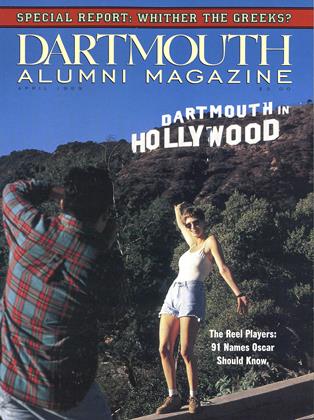Alumni take their chances at changing Dartmouth.
LOTTERIES ARE AN OLD Dartmouth tradition. Very old. Fleazar Wheelock tried to set one up in 1773. The New Hampshire Assembly wouldn't let him. Not a man to give in easily, he passed the interest in lotteries (as well as the College presidency) on to his son John. And ten years after Eleazar's abortive attempt, John finally got permission. The College lost a bundle.
But don't worry. John also learned from experience. Starting in 1787, the College ran a series of money-makers. Tickets cost $4 each, the grand prize was $2,000, and the profits helped to build the original Dartmouth Hall.
Jumping ahead a couple of hundred years, we find the College still holding lotteries—only now the prize is not vulgar cash, but first chance at desired dorm rooms. This year the grand drawing was in February, and a lot of the winners nicked Mass Row.
I've been amusing myself imagining a Dartmouth lottery that would be even further removed from mere pelf. In fact I've already run this wholly imaginary tickets have gone to a couple of dozen alums, most of whom I've had in class at one time or another. In my lottery, everybody wins, and the prizes are identical. You get to make (infantasy) one change at the College, large or small. It must be one that could really happen. Here are some answers.
Fred Berthold '45: "It's really two changes I would make, but they are integrally connected. I'd abolish fraternities, and I'd create a number of distinctive and diverse 'social spaces' to replace the fraternity spaces, a number being alcohol-free and smoking-free." (Curmudgeon's note: It's not every alum who gets his wishes granted so fast. Fred Berthold received his lottery ticket in January. One month later I rumblings of change began to occur.)
Ellen McLoughlic Saturley '77: "A number of years ago I wrote to the Powers That Be with an idea I thought deserved some consideration: that the College should allow alumni/alumnae couples to waive our 'rights' to receive individual mailings of everything from the AlumniMagazine to solicitations and class newsletters. I thought this would be environmentally responsible, and would eventually save money by decreasing printing and mailing costs. The Powers That Be responded politely but firmly. It was just too hard to do."
Will Morgan '66: "Close down football. Maybe close down sports, except for a few that speak a certain regionalism: lacrosse, cross-country skiing, canoeing, kayaking."
Elizabeth Bridges '95: "If I could change one thing about Dartmouth, it would be to include outdoor leadership training in the requirements for graduation....That would expand social interaction beyond typical venues and cliques and provide a unique opportunity to develop the character and principles with which a graduate faces the world."
John Ratigan '61: "I really don't know enough about the present reality to say. But I do have one comment. What sets Dartmouth apart is the place—and the bond that develops between the place and the people who go there. So I was pleased to see that someone who seems to appreciate that bond is the new president."
Gemma Lockhart '79: "I'd work together with Hanover to properly design every outside light with an upper shield. This would dim night lights and direct them downward. Stars would shine brightly overhead, and every person employed by or attending Dartmouth College would make an essential monthly sojourn to Shattuck Observatory."
Jenny Land '96: "At Oxford they have a reward system for students who do exceptionally well in their studies. The reward is money. One day you get a note in the mail, and enclosed is £50 from your college. You can spend it any way you choose. "I'd adapt this idea for Dartmouth. I'd give students who do exceptionally well first choice in electing courses—and also in picking work-study jobs."
(Curmudgeon's note: Something needs to be done about course elections. I know of a case last winter where 140 students tried to sign up for a course with room for 60. But I think I'd like to see the students who don't do exceptionally well accommodated, too.)
Hans Richter '89: "My niece Mary Ann Mendenhall '02 matriculated this fall. We just visited her last weekend. I asked her what she would change about the College. She mumbled something about the dating scene and how 'lame' it is. But as for her experience as a whole, she could not be happier." Mike Stanitski '92: "As for me, I don't think we should change a thing."
 View Full Issue
View Full Issue
More From This Issue
-
 Cover Story
Cover StoryBig Green in Tinseltown
April 1999 By Holly Sorensen '86 -
 Feature
FeatureProps, Wingers, And Keepers Of The Old School
April 1999 By Stuart Krohn -
 Feature
FeatureUFOs Are Real!
April 1999 By James Zug '91 -
 Feature
FeaturePeople of the Book
April 1999 By Michael Loventhal '90 -
 On the Hill
On the HillThe New Social Order
April 1999 -
 Article
ArticleA Greek Tragedy
April 1999 By Kevin Goldman '99
Noel Perrin
-
 Books
BooksTHE CHRISTENING PARTY.
February 1961 By NOEL PERRIN -
 Article
ArticleEnvironmental Impact
SEPTEMBER 1997 By Noel Perrin -
 Article
ArticleThe Collis Silverware Mystery
NOVEMBER 1997 By Noel Perrin -
 Article
ArticleThe Butcker, the Baker, the Russian-Class Taker
NOVEMBER 1998 By Noel Perrin -
 Article
ArticleA Tale of Two Libraries
MARCH 1999 By Noel Perrin -
 CURMUDGEON
CURMUDGEONSkating on Thin Ice
MARCH 2000 By Noel Perrin
Article
-
 Article
ArticleTHE JUNIOR PROM
August, 1915 -
 Article
ArticleLOCAL ASSOCIATIONS
December 1924 -
 Article
ArticleRobert Burns Collection
August 1943 -
 Article
ArticleJustice Department Conference Room Memorializes Sal Andretta '20
APRIL 1970 -
 Article
ArticleBASEBALL
JULY 1970 By JACK DE GANGE -
 Article
ArticleWHAT CONSTITUTES CULTURE
November, 1930 By President Hopkins


